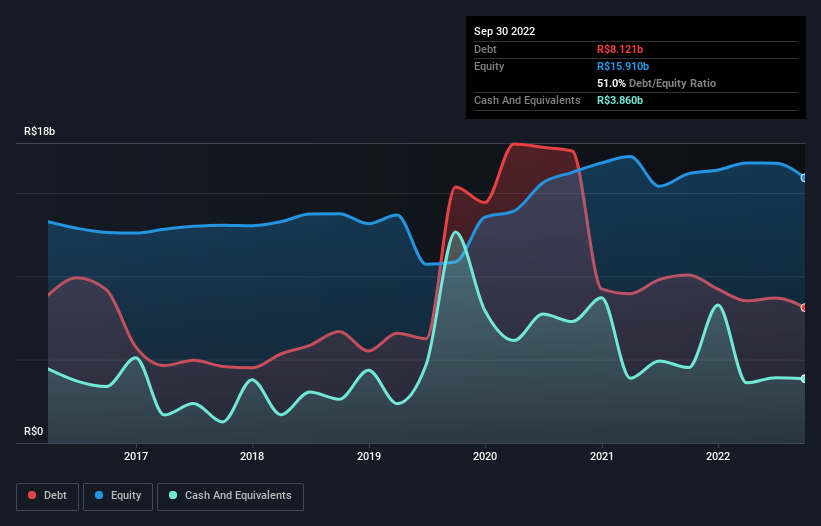- Brazil
- /
- Food and Staples Retail
- /
- BOVESPA:PCAR3
Is Companhia Brasileira de Distribuição (BVMF:PCAR3) Using Too Much Debt?

David Iben put it well when he said, 'Volatility is not a risk we care about. What we care about is avoiding the permanent loss of capital.' So it might be obvious that you need to consider debt, when you think about how risky any given stock is, because too much debt can sink a company. As with many other companies Companhia Brasileira de Distribuição (BVMF:PCAR3) makes use of debt. But is this debt a concern to shareholders?
What Risk Does Debt Bring?
Generally speaking, debt only becomes a real problem when a company can't easily pay it off, either by raising capital or with its own cash flow. In the worst case scenario, a company can go bankrupt if it cannot pay its creditors. However, a more frequent (but still costly) occurrence is where a company must issue shares at bargain-basement prices, permanently diluting shareholders, just to shore up its balance sheet. Of course, plenty of companies use debt to fund growth, without any negative consequences. The first thing to do when considering how much debt a business uses is to look at its cash and debt together.
Check out our latest analysis for Companhia Brasileira de Distribuição
What Is Companhia Brasileira de Distribuição's Debt?
As you can see below, Companhia Brasileira de Distribuição had R$8.12b of debt at September 2022, down from R$10.1b a year prior. On the flip side, it has R$3.86b in cash leading to net debt of about R$4.26b.

How Healthy Is Companhia Brasileira de Distribuição's Balance Sheet?
We can see from the most recent balance sheet that Companhia Brasileira de Distribuição had liabilities of R$13.0b falling due within a year, and liabilities of R$14.5b due beyond that. On the other hand, it had cash of R$3.86b and R$4.09b worth of receivables due within a year. So its liabilities outweigh the sum of its cash and (near-term) receivables by R$19.5b.
The deficiency here weighs heavily on the R$4.96b company itself, as if a child were struggling under the weight of an enormous back-pack full of books, his sports gear, and a trumpet. So we definitely think shareholders need to watch this one closely. After all, Companhia Brasileira de Distribuição would likely require a major re-capitalisation if it had to pay its creditors today.
We use two main ratios to inform us about debt levels relative to earnings. The first is net debt divided by earnings before interest, tax, depreciation, and amortization (EBITDA), while the second is how many times its earnings before interest and tax (EBIT) covers its interest expense (or its interest cover, for short). This way, we consider both the absolute quantum of the debt, as well as the interest rates paid on it.
Even though Companhia Brasileira de Distribuição's debt is only 1.5, its interest cover is really very low at 1.3. This does have us wondering if the company pays high interest because it is considered risky. In any case, it's safe to say the company has meaningful debt. The bad news is that Companhia Brasileira de Distribuição saw its EBIT decline by 11% over the last year. If that sort of decline is not arrested, then the managing its debt will be harder than selling broccoli flavoured ice-cream for a premium. The balance sheet is clearly the area to focus on when you are analysing debt. But ultimately the future profitability of the business will decide if Companhia Brasileira de Distribuição can strengthen its balance sheet over time. So if you're focused on the future you can check out this free report showing analyst profit forecasts.
But our final consideration is also important, because a company cannot pay debt with paper profits; it needs cold hard cash. So it's worth checking how much of that EBIT is backed by free cash flow. Over the most recent three years, Companhia Brasileira de Distribuição recorded free cash flow worth 77% of its EBIT, which is around normal, given free cash flow excludes interest and tax. This cold hard cash means it can reduce its debt when it wants to.
Our View
On the face of it, Companhia Brasileira de Distribuição's interest cover left us tentative about the stock, and its level of total liabilities was no more enticing than the one empty restaurant on the busiest night of the year. But on the bright side, its conversion of EBIT to free cash flow is a good sign, and makes us more optimistic. Looking at the bigger picture, it seems clear to us that Companhia Brasileira de Distribuição's use of debt is creating risks for the company. If all goes well, that should boost returns, but on the flip side, the risk of permanent capital loss is elevated by the debt. There's no doubt that we learn most about debt from the balance sheet. However, not all investment risk resides within the balance sheet - far from it. These risks can be hard to spot. Every company has them, and we've spotted 3 warning signs for Companhia Brasileira de Distribuição you should know about.
At the end of the day, it's often better to focus on companies that are free from net debt. You can access our special list of such companies (all with a track record of profit growth). It's free.
New: AI Stock Screener & Alerts
Our new AI Stock Screener scans the market every day to uncover opportunities.
• Dividend Powerhouses (3%+ Yield)
• Undervalued Small Caps with Insider Buying
• High growth Tech and AI Companies
Or build your own from over 50 metrics.
Have feedback on this article? Concerned about the content? Get in touch with us directly. Alternatively, email editorial-team (at) simplywallst.com.
This article by Simply Wall St is general in nature. We provide commentary based on historical data and analyst forecasts only using an unbiased methodology and our articles are not intended to be financial advice. It does not constitute a recommendation to buy or sell any stock, and does not take account of your objectives, or your financial situation. We aim to bring you long-term focused analysis driven by fundamental data. Note that our analysis may not factor in the latest price-sensitive company announcements or qualitative material. Simply Wall St has no position in any stocks mentioned.
About BOVESPA:PCAR3
Companhia Brasileira De Distribuicao
Engages in the operation of supermarkets, specialized stores, and department stores in Brazil.
Very undervalued with moderate growth potential.
Market Insights
Community Narratives




